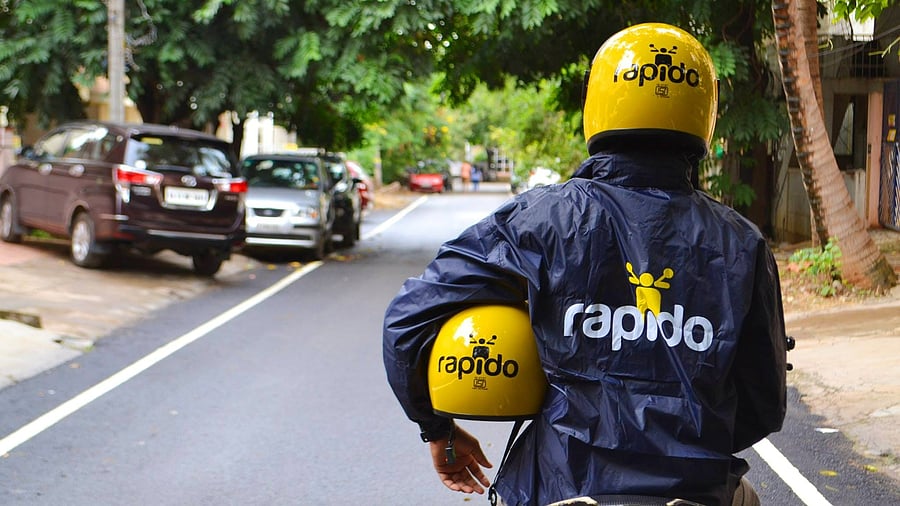
Several commuters told DH that bike taxis could be booked on Ola and Rapido till noon.
Credit: DH FILE PHOTO
Shankar Nag’s Auto Raja and Rajinikanth’s Baashha turned the figure of the autorickshaw driver into a cultural icon – and larger than life. But between cinema and the civic reality of today, that image has changed, for worse.
The deeper truth is political. For decades, autos have operated at the intersection of unions and political nexus, electoral arithmetic, informal finance, and street-level impunity. In cities like Bengaluru and Chennai, auto passengers are used to exorbitant flat fares, demanded without any care for regulations or policing. In this context, the emergence of bike taxis – affordable, digital, and widely preferred by commuters – has been viewed more as a threat to the old order.
The harsher reality is that the story of urban transport in Indian cities has been shaped more by political expediency than public purpose. No wonder that the quality of urban living has been nosediving. In addition, thanks to the missing town planning, the traffic is paralysing, civic infrastructure lags behind demand, and first- and last-mile gaps remain the single greatest deterrent to mass public transport adoption. That the state of Karnataka has chosen this moment to ban bike taxis – arguably the most efficient and flexible urban mobility innovation in recent years – is indefensible.
For years, Karnataka had allowed bike taxis to operate in legal limbo – neither formally recognising them nor explicitly prohibiting them. This ambiguity finally drew judicial scrutiny, with the High Court lifting interim protection, on June 15, due to the absence of a state-framed regulatory framework.
This refusal to regulate is out of step with both the law and the times. Under Section 93 of the Motor Vehicles Act, states have full authority to issue permits and define the terms for contract carriages, which include bike taxis. Other states – Maharashtra, Goa, Telangana, Uttar Pradesh, and Rajasthan – have done so.
The economic argument against regulation also falls apart under scrutiny. Autos require permits to operate. Nothing prevents the state from extending this to bike taxis. With an estimated 1.2 lakh riders, a modest Rs 100 monthly permit would generate Rs 15 crore in annual revenue. Bike taxis would attract a 5% GST on every fare. At an estimated eight lakh rides per day with an average fare of Rs 50, this amounts to over Rs 73 crore in potential annual GST.
We trust thousands of gig workers to deliver our dinner and packages, in their normal white number-plate bikes, but not to drop us to the nearest metro. The state objects to bike taxis using white number plates, arguing they are non-commercial vehicles.
Karnataka was the first state in the country to pass the Platform-based Gig Workers (Social Security and Welfare) Bill. It was meant to be a model of inclusion. Yet the very government that passed the law has, in effect, wiped out the primary livelihood of over one lakh gig workers overnight.
A KPMG study suggests that bike taxis serve a different commuter profile and do not cannibalise demand for the 1.8 lakh auto-rickshaws. It found that 70% of bike taxi users rely on them primarily for last-mile connectivity; 24% of residents cite poor last-mile options as a barrier to using public transport. Bike taxis filled that gap with speed, affordability, and convenience. Their absence will push more commuters towards private vehicles, increasing traffic congestion and worsening the city’s already fragile air quality.
There is solution in regulation
Some argue that bike taxis pose safety risks, could overwhelm traffic systems, and require further study before being allowed. Safety standards can be enforced through mandatory helmets, verified drivers, insurance coverage, and app-based safeguards such as GPS tracking and emergency support, which many digital platforms already offer as default.
The idea that the model needs more time to be understood does not hold. It has operated across Indian cities for nearly a decade, is already enabled under central law, and was piloted in Karnataka itself in 2021. The state must move swiftly to bring bike taxis into the legal fold – under Section 93 of the Motor Vehicles Act.
Urban mobility is a basic public need and not a favour granted by political discretion. Cities that ignore this will find themselves moving backwards, even while standing still. For all its claims as the Startup Capital, in Bengaluru, it takes less time to build a public utility app than to get a public policy approved for using it.
(The writer is a corporate advisor and independent director on corporate boards)